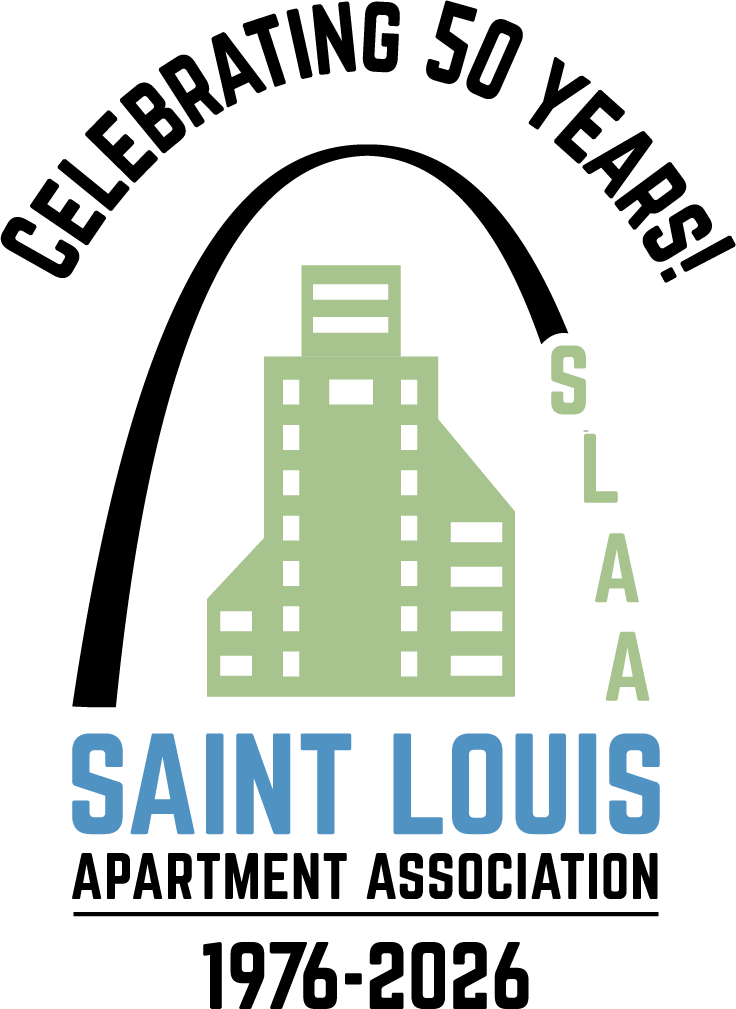National & Local: Governmental Affairs
Care to join this committee? Call Mandi in the SLAA office at 314-205-8844.
Governmental Affairs, Federal, State and Local Updates
FEBRUARY 2023
Summary, Board Bill Number 176
Introduced by Alderwoman Shameem Clark-Hubbard
An Ordinance recommended by the Board of Estimate and Apportionment establishing an Impacted Tenants' Fund to protect tenants in St. Louis City who are forced to relocate from their rental unit due to condemnation for occupancy due to the landlord’s failure to maintain the rental unit in conformance with code requirements.
Summary, Board Bill Number 180
Introduced by Alderwoman Alisha Sonnier
An Ordinance establishing a mandatory registration process for residential rental units in the City,
through the City’s Housing Conservation Program; repealing earlier adopted ordinances,
establishing and amending the Housing Conservation Program; enacting in lieu thereof, an
Ordinance pertaining to the same subject matter with provisions setting forth the procedures,
requirements, fees, regulations, inspections, issuance and revocation of Certificates of Inspection
for dwelling units; adding rental dwelling unit registration; and containing a penalty clause and
severability clause. READ MORE
December 2023
SLAA's Governmental Affairs committee met in November to discuss several federal, state and local hot issues.
State and Local
- Submetering – Direct Water Billing - Fact Sheet
- Arnold landlord registration
- This doesn’t make a big change to the existing requirement – there is no fee for registration but there is now a late for fee for failure to register.
- Safer Simpler –
- Charlie Hinderliter, Senior Vice President Governmental Affairs for the St. Louis Realtors spoke to issue. It is going statewide with exception to rural areas – noted that this differs from the meeting that was held wherein it was voted that this effort was not supported.
- Maplewood - City of Maplewood - Ordinance & City of Maplewood - Resolution
In addition, the committee continues to watch the following updates from the National Apartment Association.
- Tenant Screening
- Junk Fees
- Section 8 Voucher
- Enact and Enhance Tax Policy That Promotes Housing Supply
- Act to Stabilize Soaring Insurance Costs:
--------------------------------------------------------------------------------------------------------------------------
HBS Missouri Legislative Update - Veto Session
September 14, 2023
Governmental Affairs, May 2023
Legislative Update First Quarter
Federal:
On March 17, 2023 HUD announced it submitted its Final Rule entitled Restoring HUD’s Discriminatory Effects Standard for publication in the Federal Register. This will go into effect next week. The Fair Housing Act prohibits discrimination in housing and housing-related services because of race, color, religion, national origin, sex (including sexual orientation and gender identity), familial status, and disability. The discriminatory effects doctrine (which includes disparate impact and perpetuation of segregation) is a tool for addressing policies that unnecessarily cause systemic inequality in housing, regardless of whether they were adopted with discriminatory intent. It has long been used to challenge policies that unnecessarily exclude people from housing opportunities, including zoning requirements, lending and property insurance policies, and criminal records policies.
Along those lines, HUD issued guidance on criminal background screenings, stating that overly broad screening criteria may have a disparate impact on individuals of a particular race, national origin, or other protected class in violation of the federal Fair Housing Act. We’ve attached a link for you to review their submission.
www.hud.gov/sites/documents/HUD_OGCGUIDAPPFHASTANDCR.PDF
State:
At the beginning of the year we were faced with a few bills that deserved a watchful eye. Many of these bills have failed to gain any traction. These include providing certain rental protections to those diagnosed or suffering from PTDS, eliminating breed-specific dog bans, duty to provide new tenants with voter registration packets, prohibitions on evicting veterans unless for illegal conduct, to name a few. There are few that are making their way through the process with some success and those include HB 184, which would put the financial burden on local government for required electric vehicle charging stations. SLAA supports this bill and we’re hoping for a positive outcome. Another bill we are tracking is HB 730 which seeks to place restrictions on future eviction moratoriums. A similar bill was filed last year and while it made progress through the house, it ultimately never made it to a vote. We are hoping for a successful outcome with HB 730 this year.
Local:
At the beginning of the year, SLAR approached SLAA with the invitation to create a St. Louis City housing coalition. This was in part, in response to information that St. Louis City would be creating new tenant protection laws. On January 13th, Alderwoman Christine Ingrassia introduced Board Bill 180. This ordinance establishes in part; a right to counsel for tenants facing eviction or equivalent proceedings, a mechanism to provide counsel for all tenants in covered proceedings, and a requirement for owners, agents of owners, and landlords to disclose to their tenants certain information regarding the right to counsel in covered proceedings. This bill passed on February 10th. This program will seek to provide a staff inclusive of lawyers, paralegals, and legal assistants whose collective duty will be to assist tenants in eviction litigation. While the bill has passed and a proposed budgetary draft has been submitted, we do not have details on the reach of this program. It is our hope that this program will help tenants and landlords come together in prelitigation services to resolve eviction issues prior to litigation. We anticipate this bill to be the first of many and look forward to working with SLAR to advance positive and useful ordinances and programs that support the multifamily housing community of St. Louis City.
